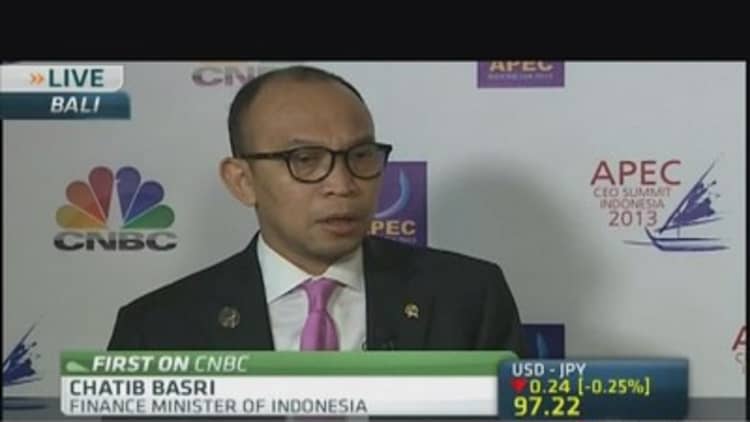
Indonesia's domestic currency has been one of the world's worst performing currencies this year, suffering an around 19 percent decline against the , but the nation's Finance Minister told CNBC he was comfortable with its value.
"Yes definitely [I am comfortable with the rupiah's level]," Chatib Basri told CNBC at the Indonesia-based Asia-Pacific Economic Cooperation CEO (APEC) Summit on Monday.
"You have to look at the world without quantitative easing. If you recall, [in] the world without QE the rupiah was around 10,000 to 11,000 [to the dollar]," said Basri, implying that the wind down of the Federal Reserve's QE program would bring the currency back to its natural level.
(Read More: Why the rupiah can't recover from the emerging market rout)
Since late May, talk of Fed tapering has panicked investors about how financial markets will cope without the U.S. central bank's steady flow of easy money. Emerging market economies, particularly those with large current account deficits like as Indonesia, suffered sharp capital outflows and consequently steep losses for their currencies.
Indonesia's central bank has made several attempts to shore up losses in the currency, including raising interest rates by 150 basis points since June, but so far the efforts have done little to boost the rupiah. However, over recent days the rupiah has shown some signs of stabilization; it has recovered from a low of 11,660 to the dollar last Monday to trade around 11,530 this Monday.
(Read More: Is the rupiah drubbing nearly over?)
Basri said recent signs of stabilization show the situation had become less bleak.
"The most important thing if you look at the recent developments, the spot and the forward markets have more-or-less converged, so that shows that the expectations of depreciation are not as high as previously thought," added Basri.
In his interview with CNBC, Basri also ruled out any use of capital controls, which would limit flows of foreign capital in and out of the economy, despite recent analyst speculation that such moves could be on the cards.
(Read More: Why Indonesia could be worse off than India)
"[Capital controls] are not on the table," Basri said. "We don't have any intention [to use them]. I still believe the best away to handle this issue is by coming up with good policies, good macro-economic stability. And as I said, if you look in the past two weeks, this market is more or less stabilized," he added.
In August, Indonesia's current account deficit swung into a surplus of $130 million from a deficit of $2.31 billion in July, suggesting that the government's attempts to slow the economy were working. In June the government cut fuel subsidies for the first time since 2008, raising gas prices by 44 percent and diesel by 22 percent.
(Read More: Strategist who correctly called rupee, rupiah collapse)
Basri told CNBC he now believed the worst to be over for Indonesia's deficit problems.
"The slowdown of the economy will reduce the pressure on the current account deficit," he said, adding that he expected the current account deficit to reach 3 percent of gross domestic product by the end of 2013, down from 4.4 percent reached in the second quarter.
— By CNBC's Katie Holliday: Follow her on Twitter @hollidaykatie

